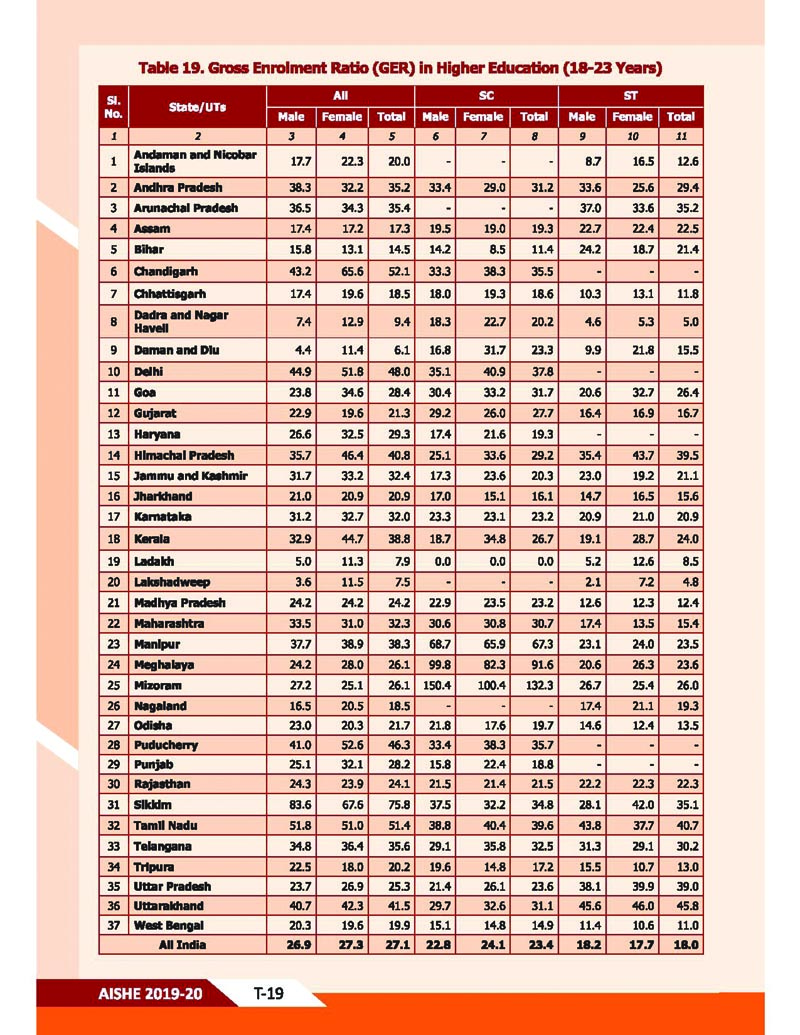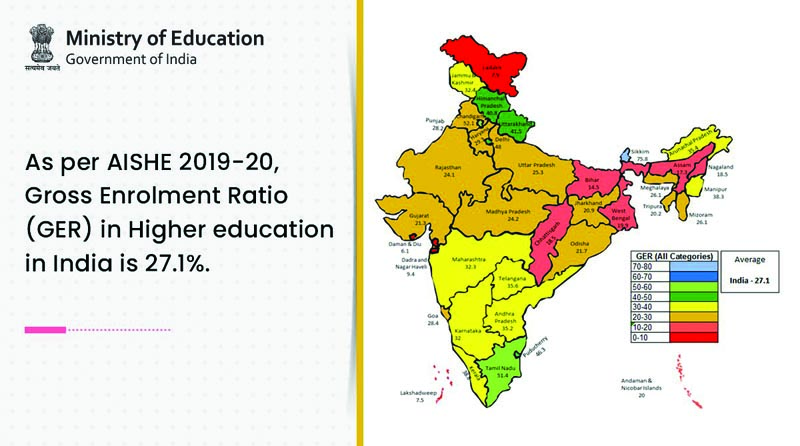NEW DELHI, JUNE 11
The Gross Enrolment Ratio (GER) in higher education has increased by over 11 percent in the last five years while the female enrolment has risen by over 18 percent during the same period, according to the All India Survey of Higher Education (AISHE), 2019-20.
The number of universities has increased by 30.5 percent during the period of 2015-16 to 2019-20 and the number of colleges has also increased by about 8.4 percent in the same period, pointed out the report released on Thursday by the Union Ministry of Education.

A total of 1,019 universities, 39,955 colleges and 9,599 stand-alone institutions participated in the survey, which provides key performance indicators on the current status of higher education in the country.
“The Gross Enrolment Ratio or the percentage of students belonging to the eligible age group enrolled in higher education is 27.1 pc in 2019-20, which has seen a rise from 26.3 pc in 2018-19 and 24.3 pc in 2014-2015.
We have noted a tremendous growth of educational institutes in the country.
📘The number of universities has increased by 30.5% from 799 in 2015-16 to 1043 in 2019-20
📘The number of colleges has increased by about 8.4% from 39,071 in 2015-16 to 42,343 in 2019-20 pic.twitter.com/DQTp1YF4AH— Dr. Ramesh Pokhriyal Nishank ( Modi Ka Parivar) (@DrRPNishank) June 10, 2021
“We have noted a tremendous growth of educational institutes in the country. The number of universities has increased by 30.5 pc from 799 in 2015-16 to 1,043 in 2019-20. The number of colleges has increased by about 8.4 pc from 39,071 in 2015-16 to 42,343 in 2019-20,” Union Education Minister Ramesh Pokhriyal ”Nishank” said in a series of tweets.
Uttar Pradesh, with its highest student enrolment in India, has 49.1 percent male and 50.9 percent female students.

While the number of students pursuing PhD in 2019-20 is 2.03 lakh against 1.17 lakh in 2014-15, only 2.7 percent colleges run PhD programme and 35.04 percent colleges run post-graduate level programmes.
According to the report, there has been a significant shift in the choice of discipline of study, as in the last five years engineering and technology registered a negative growth (-13.4), while medical science enrolment has been up by 51.1 percent in the same period.
The enrolment in higher education stands at 3.85 crore in 2019-20 compared to 3.74 crore in 2018-19, registering a growth of 11.36 lakh (3.04 pc). The total enrolment was 3.42 crore in 2014-15.
GER of students belonging to the eligible age group enrolled in higher education in 2019-20 is 27.1 percent against 26.3 percent in 2018-19 and 24.3 percent in 2014-2015. Gender too indicates an improvement in the relative access to higher education for females of the eligible age group compared to males with 1.01 in 2019-20 as against 1.00 in 2018-19.
As per the report, out of the total enrolment of 3,85,36,359 students, a vast majority of 3.06 crore students are enrolled in undergraduate which is approximately 79.5 percent of the total enrolment, followed by 11.2 percent students enrolled in post-graduation.
Maharashtra tops in the enrolment of students in universities (including constituent units) with 9,67,034, followed by Tamil Nadu with 9,26,490 students and Delhi with 8,16,110 students, as per the report.










